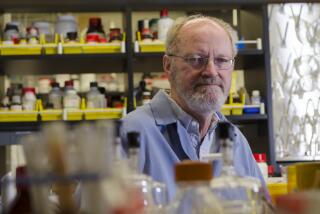Carl D. Keith dies at 88; co-inventor of three-way catalytic converter
- Share via
Reporting from Washington — Carl D. Keith, who as a principal inventor of the three-way catalytic converter made major contributions to automotive progress, clean air and human health, died Nov. 9 at a hospital in New Bern, N.C. He was 88.
He lived on Marco Island, Fla., and was in North Carolina to visit a daughter. She said he had congestive heart failure.
Based on chemistry, physics and engineering ingenuity, the three-way catalytic converter scrubbed three noxious gases from automobile exhaust. It curbed smog and eliminated some of the most damaging side effects of the internal combustion engine. An earlier converter got rid of two of the unwanted gases, but the three-way converter took its name from its ability to handle all three.
By keeping gasoline engines from spewing billions of tons of hazardous chemicals into the air, an Environmental Protection Agency report said several years ago, the converter helped save 100,000 lives and stave off hundreds of thousands of cases of throat and lung ailments.
Introduced at a time of rising concern about air pollution and environmental degradation, the catalytic converter was hailed as revolutionary and a sign that the hazards of modern technology could be kept in check.
As potentially dangerous exhaust gases whoosh toward the tailpipes of the world’s automobile fleets, the cylindrically shaped converters stand in their paths, breaking down or building up their molecular structure and rendering them relatively benign. Within the converters, the gases flow through a honeycomb of tiny tubes. Lining the tubes are substances -- known as catalysts -- specially chosen for their ability to foster chemical reactions.
The first converters neutralized hydrocarbons and carbon monoxide. But they did not treat nitrogen oxides, which are also restricted under federal clean air standards.
The process needed to eliminate the first two is the opposite of that needed to curb the third. One adds oxygen; the other strips it away.
In their breakthrough, Keith and co-inventor John J. Mooney created a catalyst that essentially could do both at the same time.
The three-way converter, based on this breakthrough, has been installed in more than 800 million gasoline-fueled automobiles and light-duty vehicles all over the world, Mooney wrote recently.
Keith was born in Stewart Creek, W.Va., in 1920. He studied at Salem College, Indiana University and DePaul University.
He joined Sinclair Oil as a research chemist in 1943 and in 1957 went to work for Engelhard, retiring in 1985 as executive vice president.
The Clean Air Act of 1970 gave significant impetus to the development of the three-way converter. Keith also patented more than 200 other inventions.
On Nov. 6, 2003, he and Mooney received the National Medal of Technology from President Bush at the White House.
His wife, Edith, died in 2000. Survivors include two daughters; six grandchildren; and eight grandchildren.
Weil writes for the Washington Post, where this obituary first appeared.






